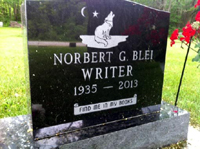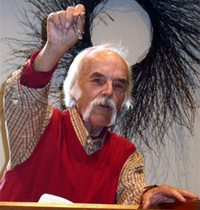
Poetry Dispatch No. 238 | June 9, 2008
Poems for the Father #2
in celebrations of Father’s Day, June 15, 2008

Father to Son by Carl Sandburg
A father sees a son nearing manhood.
What shall he tell that son?
‘Life is hard; be steel; be a rock.’
And this might stand him for the storms
and serve him for humdrum and monotony
and guide him amid sudden betrayals
and tighten him for slack moments.
‘Life is a soft loam; be gentle; go easy.’
And this too might serve him.
Brutes have been gentled where lashes failed.
The growth of a frail flower in a path up
has sometimes shattered and split a rock.
A tough will counts. So does desire.
So does a rich soft wanting.
Without rich wanting nothing arrives.
Tell him too much money has killed men
And left them dead years before burial:
The quest of lucre beyond a few easy needs
Has twisted good enough men
Sometimes into dry thwarted worms.
Tell him time as a stuff can be wasted.
Tell him to be a fool every so often
and to have no shame over having been a fool
yet learning something out of every folly
hoping to repeat none of the cheap follies
thus arriving at intimate understanding
of a world numbering many fools.
Tell him to be alone often and get at himself
and above all tell himself no lies about himself
whatever the white lies and protective fronts
he may use amongst other people.
Tell him solitude is creative if he is strong
and the final decisions are made in silent rooms.
Tell him to be different from other people
if it comes natural and easy being different.
Let him have lazy days seeking his deeper motives.
Let him seek deep for where he is a born natural.
Then he may understand Shakespeare
and the Wright brothers, Pasteur, Pavlov,
Michael Faraday and free imaginations
Bringing changes into a world resenting change.
He will be lonely enough
to have time for the work
he knows as his own.
From THE PEOPLE, YES by Carl Sandburg
Some selected Carl Sandburg recordings and books:
















Carl August Sandburg (January 6, 1878 – July 22, 1967) was an American poet, historian, novelist, balladeer, and folklorist. He was born in Galesburg, Illinois of Swedish parents and died at his home, named Connemara, in Flat Rock, North Carolina.
H. L. Mencken called Carl Sandburg “indubitably an American in every pulse-beat.” He was a successful journalist, poet, historian, biographer, and autobiographer. During the course of his career, Sandburg won two Pulitzer Prizes, one for his biography of Abraham Lincoln (Abraham Lincoln: The War Years) and one for his collection The Complete Poems of Carl Sandburg.
During the Spanish-American War, Sandburg enlisted in the 6th Illinois Infantry, and he participated in the landing at Guánica on July 25, 1898 during the invasion of Puerto Rico. Following a brief (two-week) career as a student at West Point, Sandburg chose to attend Lombard College in Galesburg. He left college without a degree in 1902.
Sandburg lived for a brief period in Milwaukee, Wisconsin, during which he became a member of the Social Democratic Party and took a strong interest in the socialist community. He worked as a secretary to Mayor Emil Seidel, the first socialist mayor in the United States.
Sandburg met Lilian Steichen, sister of the famed photographer, Edward Steichen, at the Social Democratic Headquarters. Lilian (nicknamed “Paus’l” by her mother and “Paula” by Carl) and Carl were married in 1908; they would go on to have three daughters. Sandburg moved to Harbert, Michigan. From 1912 to 1928 he lived in Chicago, nearby Evanston and Elmhurst. During this time he began work on his series of biographies on Abraham Lincoln, which would eventually earn him his Pulitzer Prize in history (for Abraham Lincoln: The War Years, 1940).
In 1945, the Sandburg family moved from the Midwest, where they’d spent most of their lives, to the Connemara estate, in Flat Rock, North Carolina. Connemara was ideal for the family, as it gave Mr. Sandburg an entire mountain top to roam and enough solitude for him to write. It also provided Mrs. Sandburg over 30 acres of pasture to raise and graze her prize-winning dairy goats.
Much of Carl Sandburg’s poetry, such as “Chicago”, focused on Chicago, Illinois, where he spent time as a reporter for the Chicago Daily News and the Day Book. His most famous description of the city is as “Hog Butcher for the World/Tool Maker, Stacker of Wheat/Player with Railroads and the Nation’s Freight Handler,/Stormy, Husky, Brawling, and City of the Big Shoulders.”
Sandburg is also beloved by generations of children for his Rootabaga Stories and Rootabaga Pigeons, a series of whimsical, sometimes melancholy stories he originally created for his own daughters. The Rootabaga Stories were born of Sandburg’s desire for “American fairy tales” to match American childhood. He felt that the European stories involving royalty and knights were inappropriate, and so populated his stories with skyscrapers, trains, corn fairies and the “Five Marrrrvelous Pretzels”.
Sandburg was awarded a Grammy Award in 1959 for Best Performance – Documentary Or Spoken Word (Other Than Comedy) for his recording of Aaron Copland’s Lincoln Portrait with the New York Philharmonic.
Here is an incomplete list of books and anthologies published by Sandburg:
- * In Reckless Ecstasy (1904) (poetry) (originally published as Charles Sandburg)
- * Incidentals (1904) (poetry and prose) (originally published as Charles Sandburg)
- * Plaint of a Rose (1908) (poetry) (originally published as Charles Sandburg)
- * Joseffy (prose) (1910) (originally published as Charles Sandburg)
- * You and Your Job (1910) (prose) (originally published as Charles Sandburg)
- * Chicago Poems (1916) (poetry)
- * Cornhuskers (1918) (poetry)
- * Chicago Race Riots (1919) (prose) (with an introduction by Walter Lippmann)
- * Clarence Darrow of Chicago (1919) (prose)
- * Smoke and Steel (1920) (poetry)
- * Rootabaga Stories (1920) (children’s stories)
- * Slabs of the Sunburnt West (1922) (poetry)
- * Rootabaga Pigeons (1923) (children’s stories)
- * Selected Poems (1926) (poetry)
- * Abraham Lincoln: The Prairie Years (1926) (biography)
- * The American Songbag (1927) (folk songs)
- * Songs of America (1927) (folk songs) (collected by Sandburg; edited by Alfred V. Frankenstein)
- * Abe Lincoln Grows Up (1928) (biography [primarily for children])
- * Good Morning, America (1928) (poetry)
- * Steichen the Photographer (1929) (history)
- * Early Moon (1930) (poetry)
- * Potato Face (1930) (children’s stories)
- * Mary Lincoln: Wife and Widow (1932) (biography)
- * The People, Yes (1936) (poetry)
- * Abraham Lincoln: The War Years (1939) (biography)
- * Storm over the Land (1942) (biography) (excerpts from Sandburg’s own Abraham Lincoln: The War Years)
- * Road to Victory (1942) (exhibition catalog) (text by Sandburg; images compiled by Edward Steichen and published by the Museum of Modern Art)
- * Home Front Memo (1943) (essays)
- * Remembrance Rock (1948) (novel)
- * Lincoln Collector: the story of the Oliver R. Barrett Lincoln collection (1949) (prose)
- * The New American Songbag (1950) (folk songs)
- * Complete Poems (1950) (poetry)
- * The wedding procession of the rag doll and the broom handle and who was in it (1950) (children’s story)
- * Always the Young Strangers (1953) (autobiography)
- * Selected poems of Carl Sandburg (1954) (poetry) (edited by Rebecca West)
- * The Family of Man (1955) (exhibition catalog) (introduction; images compiled by Edward Steichen)
- * Prairie-town boy (1955) (autobiography) (essentially excerpts from Always the Young Strangers)
- * Sandburg Range (1957) (prose and poetry)
- * Harvest Poems, 1910-1960 (1960) (poetry)
- * Wind Song (1960) (poetry)
- * Honey and Salt (1963) (poetry)
- * The Letters of Carl Sandburg (1968) (autobiographical/correspondence) (edited by Herbert Mitgang)
- * Breathing Tokens (poetry by Sandburg, edited by Margaret Sandburg) (1978) (poetry)
- * Ever the Winds of Chance (1983) (autobiography) (started by Sandburg, completed by Margaret Sandburg and George Hendrick)
- * Carl Sandburg at the movies : a poet in the silent era, 1920-1927 (1985) (selections of his reviews of silent movies – collected and edited by Dale Fetherling and Doug Fetherling)
- * Billy Sunday and other poems (1993) (edited with an introduction by George Hendrick and Willene Hendrick)
- * Poems for children nowhere near old enough to vote (1999) (compiled and with an introduction by George and Willene Hendrick)
source



















































































Recent Comments